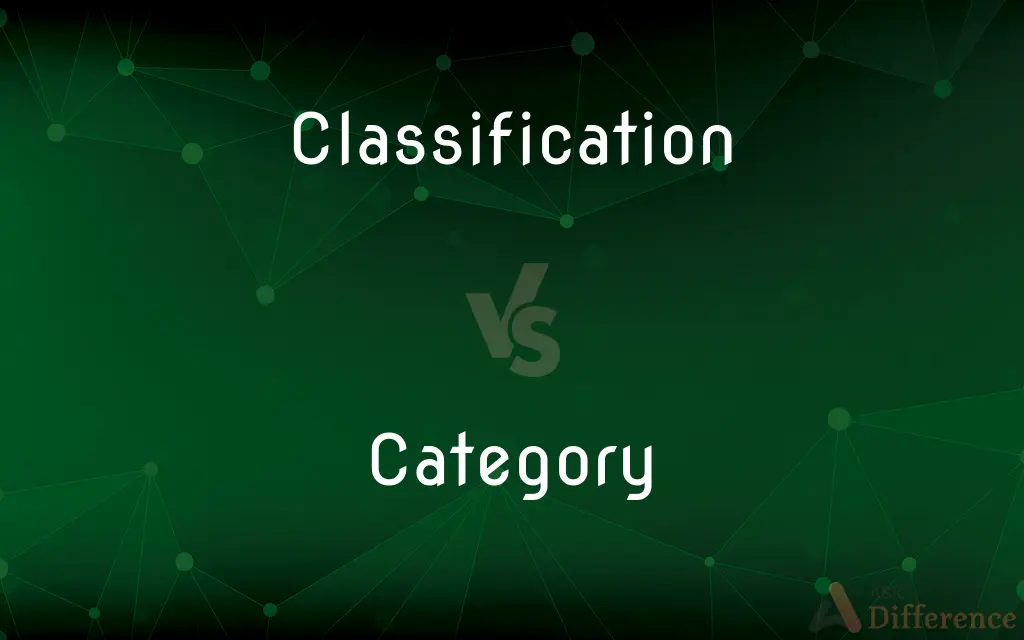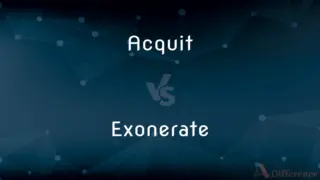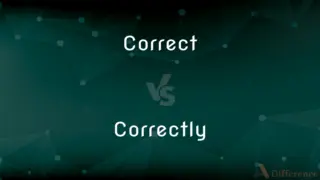Classification vs. Category — What's the Difference?
By Tayyaba Rehman & Fiza Rafique — Updated on April 18, 2024
Classification involves systematically arranging items based on shared qualities or characteristics, whereas a category is a group within a classification.

Difference Between Classification and Category
Table of Contents
ADVERTISEMENT
Key Differences
Classification is a process used to organize or sort objects, data, or concepts into groups based on common characteristics, while categories are the specific groups that result from this process.
In the field of taxonomy, classification includes creating hierarchical structures such as kingdoms, phyla, and species, whereas a category might specifically refer to one of these ranks.
In data analysis, classification helps in sorting data into predefined categories, whereas categories are used to label these data points for easier analysis and interpretation.
Classification systems can be complex, involving multiple layers and criteria, whereas a category is typically simpler, focusing on a single aspect of similarity among its members.
In everyday language, classification is often used to refer to the method or criteria of grouping, while categories are used to refer to the actual groups that have been formed based on these criteria.
ADVERTISEMENT
Comparison Chart
Definition
The method of grouping based on shared characteristics.
A group within a classification.
Focus
Process and criteria of grouping.
The result of grouping.
Complexity
Can be multi-layered and detailed.
Generally single-layered and specific.
Usage in taxonomy
Refers to the overall system.
Refers to specific ranks like genus, species.
Application in analytics
Used to sort data into groups.
The labels for data points.
Compare with Definitions
Classification
The act of organizing things based on common traits.
Libraries use classification to arrange books by subject.
Category
In marketing, a specific product group.
The beverage category includes soft drinks, water, and tea.
Classification
A systematic approach in taxonomy.
Biological classification sorts organisms into groups like species and genera.
Category
A label used to denote a group sharing characteristics.
'Fiction' is a category in bookstores.
Classification
In statistics, a method to predict group membership.
Classification algorithms determine whether an email is spam or not.
Category
A class or division in a system of classification.
In the Dewey Decimal system, '500' is the category for science.
Classification
The assignment of objects into predefined categories.
Classification of movies into genres helps viewers choose.
Category
A grouping used in competitions.
Categories in a music contest might include jazz, rock, and classical.
Classification
A tool in data management.
Classification of customer feedback can highlight areas needing improvement.
Category
A designation in taxonomy.
In biology, 'mammal' is a category denoting warm-blooded, hair-bearing animals.
Classification
The action or process of classifying something
The classification of disease according to symptoms
Category
A class or division of people or things regarded as having particular shared characteristics
The various categories of research
Classification
The act, process, or result of classifying.
Category
Each of a possibly exhaustive set of classes among which all things might be distributed.
Classification
A category or class.
Category
A specifically defined division in a system of classification; a class.
Classification
(Biology) The systematic grouping of organisms into categories on the basis of evolutionary or structural relationships between them; taxonomy.
Category
Aristotle's modes of objective being, such as quality, quantity, or relation, that are inherent in all things.
Classification
The act of forming into a class or classes; a distribution into groups, as classes, orders, families, etc., according to some common relations or attributes.
Category
Kant's modes of subjective understanding, such as singularity, universality, or particularity, that organize perceptions into knowledge.
Classification
The act of forming into a class or classes; a distribution into groups, as classes, orders, families, etc., according to some common relations or affinities.
Category
A basic logical type of philosophical conception in post-Kantian philosophy.
Classification
The act of distributing things into classes or categories of the same type
Category
A property or structural unit of a language, such as a part of speech or a type of phrase.
Classification
A group of people or things arranged by class or category
Category
A specific grammatical defining property of a linguistic unit or class, such as number or gender in the noun and tense or voice in the verb.
Classification
The basic cognitive process of arranging into classes or categories
Category
(Mathematics) A class of objects, together with a class of morphisms between those objects, and an associative composition rule for those morphisms. Categories are used to study a wide variety of mathematical constructions in a similar way.
Classification
Restriction imposed by the government on documents or weapons that are available only to certain authorized people
Category
A group, often named or numbered, to which items are assigned based on similarity or defined criteria.
This steep and dangerous climb belongs to the most difficult category.
I wouldn't put this book in the same category as the author's first novel.
Category
(mathematics) A collection of objects, together with a transitively closed collection of composable arrows between them, such that every object has an identity arrow, and such that arrow composition is associative.
One well-known category has sets as objects and functions as arrows.
Just as a monoid consists of an underlying set with a binary operation "on top of it" which is closed, associative and with an identity, a category consists of an underlying digraph with an arrow composition operation "on top of it" which is transitively closed, associative, and with an identity at each object. In fact, a category's composition operation, when restricted to a single one of its objects, turns that object's set of arrows (which would all be loops) into a monoid.
Category
One of the highest classes to which the objects of knowledge or thought can be reduced, and by which they can be arranged in a system; an ultimate or undecomposable conception; a predicament.
The categories or predicaments - the former a Greek word, the latter its literal translation in the Latin language - were intended by Aristotle and his followers as an enumeration of all things capable of being named; an enumeration by the summa genera i.e., the most extensive classes into which things could be distributed.
Category
Class; also, state, condition, or predicament; as, we are both in the same category.
There is in modern literature a whole class of writers standing within the same category.
Category
A collection of things sharing a common attribute;
There are two classes of detergents
Category
A general concept that marks divisions or coordinations in a conceptual scheme
Common Curiosities
What is the primary difference between classification and category?
Classification is the process of organizing into groups; a category is a group within a classification.
What is an example of a category in biology?
'Amphibians' is a category in the biological classification system.
How do classifications help in data analysis?
They allow for organizing data into categories for better analysis and decision-making.
Can categories be subjective?
Yes, especially in fields like art and literature, where categorization can be based on personal interpretation.
What is an example of a classification system?
The Linnaean system in biology, which classifies organisms into kingdoms, classes, orders, etc.
What is the difference between a category and a type?
A category is broader and can include multiple types within it.
How does technology use classification?
In machine learning, classification algorithms predict the category of data inputs.
Can a category exist without classification?
No, categories are formed as a result of the classification process.
Is classification only applicable to biological sciences?
No, it is used in various fields, including data science, library science, and more.
Are all classification systems hierarchical?
Many are, like biological taxonomy, but some may be more flat, especially in informal uses.
How does classification affect learning?
It helps in structuring information, making it easier to understand and remember.
What role do categories play in marketing?
They help marketers organize products and target communications effectively.
Why is accurate classification important in science?
It ensures that information is organized systematically, aiding in research and communication.
How is classification used in everyday life?
From sorting laundry to organizing apps on a phone, classification helps in managing various tasks.
Share Your Discovery

Previous Comparison
Acquit vs. Exonerate
Next Comparison
Correct vs. CorrectlyAuthor Spotlight
Written by
Tayyaba RehmanTayyaba Rehman is a distinguished writer, currently serving as a primary contributor to askdifference.com. As a researcher in semantics and etymology, Tayyaba's passion for the complexity of languages and their distinctions has found a perfect home on the platform. Tayyaba delves into the intricacies of language, distinguishing between commonly confused words and phrases, thereby providing clarity for readers worldwide.
Co-written by
Fiza RafiqueFiza Rafique is a skilled content writer at AskDifference.com, where she meticulously refines and enhances written pieces. Drawing from her vast editorial expertise, Fiza ensures clarity, accuracy, and precision in every article. Passionate about language, she continually seeks to elevate the quality of content for readers worldwide.













































